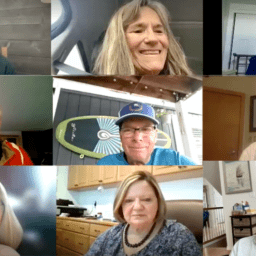More men than women are diagnosed with Parkinson’s by a ratio of nearly 2:1. Several studies have looked into why this is the case and some evidence suggests that estrogen exposure in women could be one of the primary reasons.
But the rate of diagnosis is not the only difference. Women and men diagnosed with Parkinson’s experience differences when it comes to presenting symptoms, sleep problems, cognitive impact, responses to surgery, medication side effects, emotional health, the care partner experience and more.
Perhaps it is these differences, especially those related to care and emotional health, that have resulted in women’s only Parkinson’s support groups growing at such a rapid rate. If you’re a woman living with Parkinson’s, here are five reasons it could be time for you to join (or start) a women’s only Parkinson’s support group.
#1 Moral Support
One of the most difficult aspects of living with Parkinson’s that women face is that their caregiving for others doesn’t stop just because Parkinson’s knocks on their door.
At diagnosis, many women are providing care to their children, sometimes their aging parents and their home. It’s not easy in that situation to switch from the one providing the care to receiving it, even if it were readily available to them, which studies indicate it’s not.
Women with Parkinson’s are more likely to pay for care, maintain their role as care partners to their family members and lack the informal caregiving their male counterparts receive.
This is why a women’s only Parkinson’s support group can be such a vital part of living well.
Women with Parkinson’s understand the unique circumstances each other are in, and they can provide the moral and social support each other need to stay positive and fight for their health.
Women we’ve spoken to who are part of women’s only support groups often comment on how important building their community has been. These women receive emotional support from each other; offer practical help to those who are living on their own or who are not receiving care from their spouses (such as taking each other to appointments); and create a safe space where they can talk about female-specific topics such as menopause, female intimacy, personal care tips and more.
#2 Information
Women are natural repositories of information and most love to share what they’ve learned with others, especially in informal ways. This is why a local support group can be such a lifeline.
They share experiences they’ve had with local doctors and other members of their care team, community resources that have been helpful to them, exercise classes they love and more.
Women also share a treasure trove of information about topics such as:
- How to find the right doctor for their situation – a doctor who will take their concerns seriously and who understands that Parkinson’s shows up differently in women than it does for men
- How to improve communication with their care partners
- How to manage and mitigate common side effects
- Where to locate resources in the community
- Ideas on experiments to try that could help improve their quality of life (tips around food, diets, exercise, complementary therapies, homecare providers, delivery services, etc.)
- Recommendations for the best massage therapists, physical and occupational therapists, yoga therapists, psychologists, boxing gyms, dance teachers and more in their local area
#3 Fun
This seems obvious; however, when you’re trying to live well with Parkinson’s, sometimes the tasks you must complete in order to do so—tracking and taking medications, going to doctor’s appointment, exercising, preparing healthy food, taking care of family, etc.—take up nearly every minute of your day. Many women we’ve talked to said fun often stays at the bottom of the list.
However, it is those same women who said how much their lives improved when they built time for fun and play, whatever that means for them, into their day.
And many of those women have connected with the women in their groups over shared hobbies, experiences and goals. They ride bikes together, attend the same yoga class, spar against each other at boxing, paint pottery, scrapbook, talk about their favorite books and even better, they encourage each other along the way.
#4 Growth
One of the most significant benefits of being in a women’s only support group is that each woman has the power to normalize the experiences they’re having for others.
Many times women with Parkinson’s are so busy managing their lives and the lives of others that they begin to isolate themselves. When that happens, they begin to feel like they’re all alone in their thoughts and experiences. They ruminate about their problems and begin to feel more and more different and disconnected from others. This can lead to greater incidences of depression.
However, when they connect with others and bond through shared experiences, they open themselves up to greater happiness, growth and development. And many times this bonding is expressed to even greater degrees when they take their shared interests out into the world.
They collaborate on projects, they mentor people working in similar fields, they become advocates and they build the courage, strength and resiliency they may have lost while trying to manage their illness.
#5 Friendship
Friends have the power to extend your life. Not the online-only friends, but the vital ones you spend time with and laugh and lament with. Those are the ones who have the greatest impact on your health and happiness and they’re critical when it comes to living well with Parkinson’s. According to research by Dr. Robin Dunbar, an evolutionary psychologist at the University of Oxford, you need between three and five of them for optimal well-being.
Dr. Condeluci, a longtime friend of the Davis Phinney Foundation and expert on social dynamics agrees. In this video, he talks about the importance of social capital and the value that relationships bring to our lives. One of the most powerful pieces of research he cites was conducted by Robert Putnam, a professor of public policy at the Harvard University John F. Kennedy School of Government and author of Bowling Alone. Putnam discovered that if you don’t belong to a community, and you decide to join one, then you cut your risk of dying in half over the next year. Similarly, an AARP study concluded that long-term isolation is the equivalent of smoking 15 cigarettes a day.
When you add that to all of the other benefits you get from a women’s only Parkinson’s support group, joining or starting one may be exactly what you need to live even better with Parkinson’s.







In my County in upstate NY, we do NOT have a single Parkinson’s Support Group. I have been thinking about establishing one . I have no idea where to begin? Any one have the ABC’s in starting such a thing?
Hi Bernadette,
Thank you so much for reaching out, and I’m glad you asked! We recently put together a new guide called “How to Start a Women’s Only Parkinson’s Support Group.” While this is a guide written specifically for women who want to start a women’s only group, many of the same principles apply if you want to begin a co-ed group as well. We’ll be sharing it in the next couple of weeks so be sure to check back.
Has the guide been printed for “women’s only “ support groups ?
The guide will be released soon! Check back here shortly to download the fantastic resource!
Comment
I am interested in a Women’s Support Group. If there is one in my area please give me more information. If there is not a group in my area please send me information on how to start one?
You can download our new guide called How To Start A Women’s Only Parkinson’s Support Group by visiting the included link!
Can’t wait for the guide, would love to start a local chapter. I was diagnosed at 45 but knew at 39 I had Parkinson’s disease having witnessed my Dad and Grandmother with PD.
Wait no longer, Deborah! You can access the guide by visiting our latest blog How To Start A Women’s Only Support Group.
I need all the support I can get. I am so very upset about this pd. Feel so alone in my world.
Hi Helen – We’re glad you found us. Support groups can be such a great outlet and place of hope for people with Parkinson’s. If you think you’d like to talk to someone about your experience, please reach out to one of our Ambassadors. They are great resources for so many in our community. You can find out all about them here: https://davisphinneyfoundation.org/resources/ambassadors.